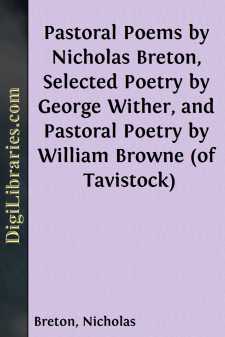Categories
- Antiques & Collectibles 13
- Architecture 36
- Art 48
- Bibles 22
- Biography & Autobiography 813
- Body, Mind & Spirit 142
- Business & Economics 28
- Children's Books 14
- Children's Fiction 11
- Computers 4
- Cooking 94
- Crafts & Hobbies 4
- Drama 346
- Education 46
- Family & Relationships 57
- Fiction 11829
- Games 19
- Gardening 17
- Health & Fitness 34
- History 1377
- House & Home 1
- Humor 147
- Juvenile Fiction 1873
- Juvenile Nonfiction 202
- Language Arts & Disciplines 88
- Law 16
- Literary Collections 686
- Literary Criticism 179
- Mathematics 13
- Medical 41
- Music 40
- Nature 179
- Non-Classifiable 1768
- Performing Arts 7
- Periodicals 1453
- Philosophy 64
- Photography 2
- Poetry 896
- Political Science 203
- Psychology 42
- Reference 154
- Religion 513
- Science 126
- Self-Help 84
- Social Science 81
- Sports & Recreation 34
- Study Aids 3
- Technology & Engineering 59
- Transportation 23
- Travel 463
- True Crime 29
Pastoral Poems by Nicholas Breton, Selected Poetry by George Wither, and Pastoral Poetry by William Browne (of Tavistock)
by: Nicholas Breton
Categories:
Description:
Excerpt
There are few issues attended with greater uncertainty than the fate of a poet, and of the three represented herein it may be said that they survive but tardily in public interest. Such a state of things, in spite of all pleading, is quite beyond reason; hence the purport of this small Anthology is at once obvious.
A group of poets graced with rarest charm and linked together by several and varied circumstances, each one figures here in unique evidence and bold relief of individuality. They are called of the order Spenserian; servants at the altar to the Pastoral Muse; and, in the reckoning of time, belong to that glorious age of great Elizabeth. Nicholas Breton (or Britton, as it is pronounced) and William Browne were both contributors to England's Helicon, of 1614, and Browne and Wither each submitted verses for The Shepherd's Pipe, a publication of the same year. The former two were, in turn, under the patronage of that most cultured family, the Herberts, Breton being a protégé of "Sidney's sister, Pembroke's mother," whom Browne (and not Ben Jonson, as is commonly said) eulogised thus in elegy. George Wither, being Browne's intimate friend, was presumably not unappreciated by the kinsfolk of George Herbert. Thus do they appear as in a bond of spiritual union.
Breton, a step-son to the poet Gascoigne, and the elder of our fascinating trio, is conspicuous for an unswerving, whole-hearted attachment to nature and rural scenes. It is in the pastoral lyric where, with tenderest devotion, he pursues, untrammelled, a light and free-born fancy. His fertile, varied muse, laden with the passionate exaggerations of love-lorn swain, is yet charged with richest imagery and thought, full to overflowing with joyous abandonment, and sweet with the perfume of many flowers, culled in distant fields.
Wither, though best remembered by exploits in the political arena, is none the less a poet of deep and purest feeling. To be sure, his best and earlier work has all of that delightful extravagance and amorous colouring peculiar to the age. But there is reflected a homely dignity and mobile, felicitous vein in which the poet seems endowed with every attribute of a melodist. Exquisite, graceful and diverse he, at times, would soar to flights of highest inspiration and bedeck the page with gems of rarest worth. In the heptasyllabic couplet he is decidedly successful.
And lastly William Browne, than whom we have not a more modest and retiring singer, here makes his bow with a slender portfolio of excerpts. Whatever else may transpire it is certain that labour such as his bears the assurance of unsullied happiness and overflowing joy. It is quaint, simple, unassuming; without affectation, full of pathos, and gently sensitive. He was a man who knew no guile, and his sweet and artless nature is faithfully portrayed in the outpourings of an impressionable, poetic soul. To dance with rustic maidens on the lea; to sing by moonlight to the piper's strain; to be happy, always happy, such is the theme, delicate and refined, of these our half-forgotten poets.
W. B. KEMPLING.
Nicholas Breton
A Sweet Pastoral
Good Muse, rock me asleep
With some sweet harmony:
The weary eye is not to keep
Thy wary company.
Sweet Love, begone awhile,
Thou knowest my heaviness:
Beauty is born but to beguile
My heart of happiness....


